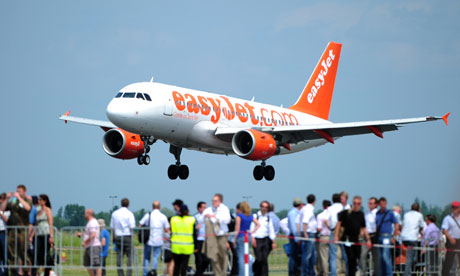Winter losses (a standard feature at easyJet) reduced by a quartereven in a period of a high fuel prices. The share price stands at a five-year high


Spectators watch an Easyjet airplane land at the International Aerospace Exhibition (ILA) in 2010 in Berlin. Photograph: Johannes Eisele/AFP/Getty Images
There can't be many established consumer-facing businesses in Europe that can implement big price rises and yet experience an increase in demand. This happy position is enjoyed by easyJet, where revenue per seat rose from £45.11 to £50.42 — or 12% — in the six months to March and the 204 aeroplanes flew with fewer empty seats.
But look at the contortions easyJet performed to avoid saying, in plain English, that it increased fares. The improvement in revenue per seat was "driven by a combination of tighter market capacity, improvements in revenue management, website initiatives and the 'europe by easyJet' marketing campaign," according to today's statement.
What the company means is that competition reduced as a couple of rivals went bust; it abandoned introductory offers on new-ish routes in continental Europe; booking fees were increased from £8 to £9; and the cost of checking in bags rose as a per-distance formula was launched. And, yes, if you must, maybe the website became simpler to use (though it never seemed confusing in the first place).
The net effect is remarkable. Winter losses (a standard feature at easyJet) reduced by a quarter even in a period of a high fuel prices. The share price stands at a five-year high. Sir Stelios Haji-Ioannou, agitating for improved returns for shareholders, was not stunned into silence — but he had no new complaints.
One can understand, of course, why easyJet doesn't wish to shout about its ability to charge customers more. It's a budget airline. And, in common with the rest of the industry, it is attempting to argue that increases to air passenger duty are a grave danger to the nation. That's a tricky case to make when you're increasing prices yourself and demonstrating what the market will bear.

No comments:
Post a Comment